Guide to the classics: Plato’s Republic
- Written by Matthew Sharpe, Associate Professor in Philosophy, Deakin University
Western philosophy is a series of footnotes to Plato, the old saying goes. And The Republic (c. 375 BCE), featuring Plato’s teacher Socrates in dialogue with several friends, is unquestionably central to Plato’s thought.
There are few subjects that Plato’s masterpiece does not touch or play on: political theory, education, myth, psychology, ethics, epistemology, cultural criticism, drama and comedy.
Little surprise then, that The Republic continues to be claimed by people with the most diverse convictions and agendas.
The Nazis pointed to the text’s seeming advocacy of eugenics. Yet Martin Luther King Jr nominated The Republic as the one book he would have taken to a deserted island, alongside the Bible.
Karl Popper famously accused The Republic of being a blueprint for illiberal, closed societies. Yet today, we can hear its echoes in the dazzling hyper-libertarian utopias envisaged by the Silicon Valley set.
The Republic’s famous allegory of the cave, which suggests that people’s ordinary sense of reality may be illusory, continues to shape our cultural imagination. It has been revisited again and again in literature, as well as in classic sci-fi films like The Matrix.
So, how can we make sense of this extraordinary text today?
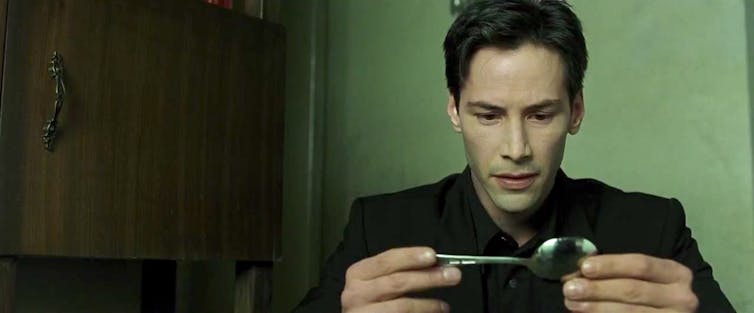 Keanu Reeves in The Matrix (1999): the film revisits some of Plato’s ideas outlined in The Republic.
Warner Bros., Village Roadshow Pictures, Groucho Film Partnership
Keanu Reeves in The Matrix (1999): the film revisits some of Plato’s ideas outlined in The Republic.
Warner Bros., Village Roadshow Pictures, Groucho Film Partnership
Read more: The Matrix 20 years on: how a sci-fi film tackled big philosophical questions
Utopia
Divided into ten “books”, the Republic is mostly taught as a text championing a series of radical prescriptions concerning the best city (polis) or regime (politeia).
At a certain point, Plato’s Socrates tells his young friends that the best city will be one in which the population is divided into three castes. On top will be a ruling caste of (yes) philosopher-guardians.
The second class will be “auxiliaries” or soldiers who will share everything in common, including wives and children. Indeed, Socrates depicts men and women as absolutely equal in all decisive senses. The third class are craftspeople and traders more recognisable to us today.
This is all very pie-in-the-sky stuff. When Socrates suggests that justice is only possible if philosophers become kings, or kings philosophers, his young companion Glaucon jokes that most people on hearing this will probably reach for their weapons.
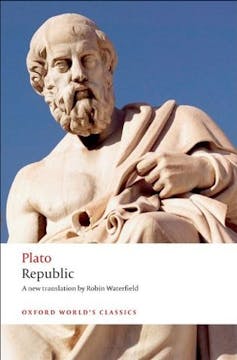 Less amusing is the proposed power of Socrates’ enlightened guardians to “breed” men and women as breeders selectively mate horses, dogs or fighting birds. The best warriors will get to sleep with the most beautiful women. There will be rigged “lotteries” so that the lesser-credentialed think it is just bad luck that they cannot “hook up” with the alphas.
Babies will be taken from their mothers by the rulers to a kind of state crèche. More ominously, children born with defects will be “hidden away” (katakrypsousin).
Everything is to be arranged so everyone can say “mine” about the same things. Each person will not know who their immediate biological family is. So, they will consider all their fellow-citizens as brothers and sisters, mothers and fathers.
Read more:
Where to start reading philosophy?
Dystopia
We can understand at this point why Nazi educationalists looked to The Republic as a precedent for some of their programs. Contemporary dreamers of a “dark enlightenment” wherein techy people “with high IQs” can “opt out” of wider society are also finding their way back to the future as depicted in The Republic Book V.
Why many other defenders of political liberty admire Plato’s text is less clear. But, as mentioned, there are many other things the book discusses than Socrates’ seemingly ideal “city in speech”.
Less amusing is the proposed power of Socrates’ enlightened guardians to “breed” men and women as breeders selectively mate horses, dogs or fighting birds. The best warriors will get to sleep with the most beautiful women. There will be rigged “lotteries” so that the lesser-credentialed think it is just bad luck that they cannot “hook up” with the alphas.
Babies will be taken from their mothers by the rulers to a kind of state crèche. More ominously, children born with defects will be “hidden away” (katakrypsousin).
Everything is to be arranged so everyone can say “mine” about the same things. Each person will not know who their immediate biological family is. So, they will consider all their fellow-citizens as brothers and sisters, mothers and fathers.
Read more:
Where to start reading philosophy?
Dystopia
We can understand at this point why Nazi educationalists looked to The Republic as a precedent for some of their programs. Contemporary dreamers of a “dark enlightenment” wherein techy people “with high IQs” can “opt out” of wider society are also finding their way back to the future as depicted in The Republic Book V.
Why many other defenders of political liberty admire Plato’s text is less clear. But, as mentioned, there are many other things the book discusses than Socrates’ seemingly ideal “city in speech”.
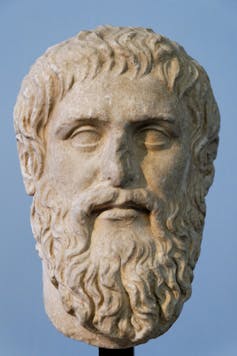 A Roman copy of the portrait of Plato made by Silanion ca. 370 BC for the Academia in Athens.
Wikimedia Commons
The Republic’s principal concern is the question of what justice is. Does being just benefit the just persons themselves, or those whom they aid, or both? Is it good for a person to live a just life?
To answer, The Republic sets up a connection between types and parts of the human psyche (mind, soul) and different political systems. For some systems and people, honour and its pursuit is considered the highest good. In other societies, like our own, the pursuit of money as the means to pleasure, power, and satisfying desires is predominant.
Socrates plausibly suggests that it would seem to be best that our political leaders are people who desire wisdom. For such people will be least moved by the desires for status and riches that produce civil dissension.
But then, it is almost impossible to imagine how such a ruling elite could ever be created without great injustices. How everybody else could be “persuaded” to accept their claims to rule is also unclear - as is grasping just how Plato’s guardians could get ordinary citizens to give up their kids to the state for the greater good.
The cycle of regimes
Given these problems with the utopian interpretation of The Republic, some modern commentators take seriously Socrates’ repeated hints that we should consider what he is saying with a grain of salt.
In the wider context of the dialogue, Socrates presents the image of the three-caste city in order to provide his friends with an image of what a just individual soul would be like. Such a soul would be one in which wisdom rules over the desires for honour and pleasures. “Justice” would apparently be something like the inner harmony of the soul’s parts.
The famous “best city”, which has produced such divided reactions from commentators, is therefore a methodological model. If we can glimpse justice in something as big as a city, Socrates suggests, we might know what to look for in a person.
Small wonder that Socrates warns his friend: “you should know, Glaucon, that in my opinion, we will never get a precise answer using our present methods of argument”.
A Roman copy of the portrait of Plato made by Silanion ca. 370 BC for the Academia in Athens.
Wikimedia Commons
The Republic’s principal concern is the question of what justice is. Does being just benefit the just persons themselves, or those whom they aid, or both? Is it good for a person to live a just life?
To answer, The Republic sets up a connection between types and parts of the human psyche (mind, soul) and different political systems. For some systems and people, honour and its pursuit is considered the highest good. In other societies, like our own, the pursuit of money as the means to pleasure, power, and satisfying desires is predominant.
Socrates plausibly suggests that it would seem to be best that our political leaders are people who desire wisdom. For such people will be least moved by the desires for status and riches that produce civil dissension.
But then, it is almost impossible to imagine how such a ruling elite could ever be created without great injustices. How everybody else could be “persuaded” to accept their claims to rule is also unclear - as is grasping just how Plato’s guardians could get ordinary citizens to give up their kids to the state for the greater good.
The cycle of regimes
Given these problems with the utopian interpretation of The Republic, some modern commentators take seriously Socrates’ repeated hints that we should consider what he is saying with a grain of salt.
In the wider context of the dialogue, Socrates presents the image of the three-caste city in order to provide his friends with an image of what a just individual soul would be like. Such a soul would be one in which wisdom rules over the desires for honour and pleasures. “Justice” would apparently be something like the inner harmony of the soul’s parts.
The famous “best city”, which has produced such divided reactions from commentators, is therefore a methodological model. If we can glimpse justice in something as big as a city, Socrates suggests, we might know what to look for in a person.
Small wonder that Socrates warns his friend: “you should know, Glaucon, that in my opinion, we will never get a precise answer using our present methods of argument”.
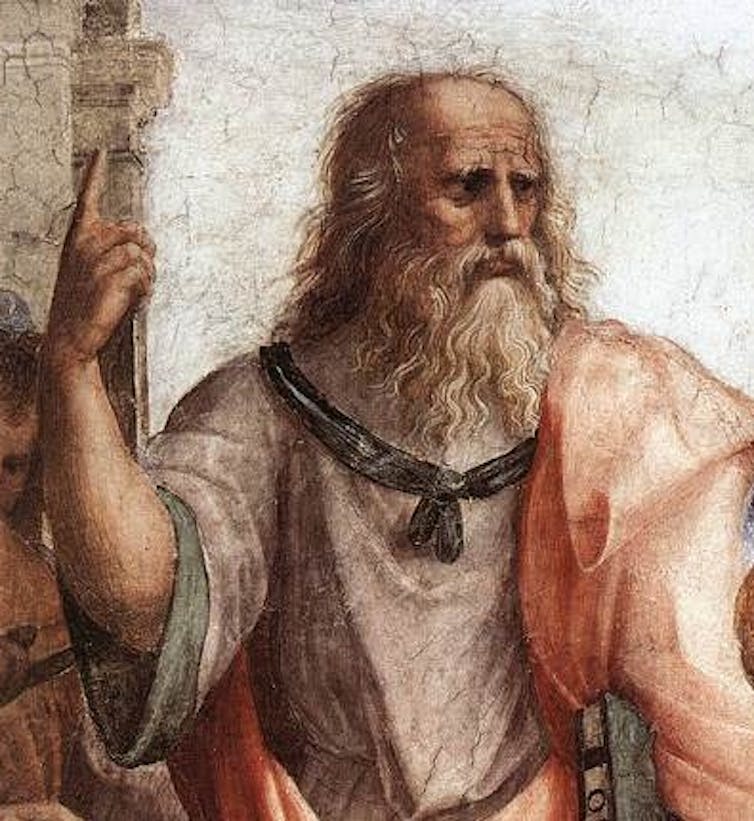 Portrait of Plato in Raphael’s The School of Athens fresco, 1509.
Wikimedia Commons
If there is a political message in The Republic at all, it is not about creating a recipe for the ideal city.
The true meaning of the Republic instead lies in how it stages the inescapable difficulties of political life, given what Isaiah Berlin called the crooked timber of human nature.
In fact, not just Socrates’ kallipolis (beautiful city), but each of the political regimes that he examines in The Republic prove flawed and unstable.
Regimes led by honour-loving nobles (timocracies) can only survive based on elites’ harshness towards inferiors, sowing grapes of wrath. Such elites tend over time to become scornful of public duties, and as they age, to turn from matters of war to finance:
finding ways of spending money for themselves, then they stretch the laws relating to money-making, then they and their wives disobey the laws altogether.
This vision sounds oddly prophetic after the Global Financial Crisis of 2007-8. Oligarchies hollow out the middle classes. By lending money at interest, they create “a considerable amount of drones and beggars in the city”. At a certain point, these “have-nots” rightly revolt. Democracies follow.
But Plato is no simple friend of democracies, either. Socrates asserts that the democratic citizens’ love of freedom tends to undermine traditional authorities. Teachers become afraid of students and parents of their children. As the generations mix, “the old stoop to play … and pleasantry, imitating the young for fear of appearing disagreeable and authoritarian …”
These passages have appeared prescient to many conservatives since the 60s.
A moral vacuum ensues in which demagogues can arise, promising to make the city great again. At this point, Socrates warns, democracies can devolve into tyrannies.
In these deeply unjust regimes, a single man can play out his hubris and pathologies on entire peoples, after removing his foes by force or fraud.
For some commentators, these passages have seemed most prophetic after 2016.
Read more:
Will Trump be a tyrant, and how will we tell? Some classical pointers
Justice, philosophy, and the cave
What, then, does The Republic say positively about justice?
An iconic exchange in The Republic pits Socrates against the sophist Thrasymachus. The latter argues that “might” (boldness, strength and cunning) “makes right”.
Socrates’ claim that justice involves harming no one, and cultivating the knowledge to benefit others and oneself, sounds to the “beast-like” Thrasymachus as naive as it still sounds to “realists” today.
Glaucon and Adeimantus, amongst Socrates’ other companions, also wonder whether treating others justly is not a recipe for individual unhappiness. Anticipating Mr Tolkein, Glaucon puts Socrates’ view to the test by imagining a magic ring conferring invisibility. Wouldn’t even Socrates take advantage of this power to feather his own nest on the quiet?
Unbelievably, Socrates replies “no”.
The argumentative arc of The Republic in fact closes in book IX, at the end of the account of a tyrant’s life. Here, we are made to see that the tyrant’s amoral pursuit of egoistic appetites, which people often imagine as the best of all possible lives, is a recipe for misery and paranoia.
In one of the mathematical plays that dot the text, Socrates tells us that such a monomaniac will be exactly 729 times less happy than a wise person. For the author of The Republic, grinning with irony, it is exponentially better to be just than to live unjustly.
Only when we see this can we grasp why Plato spills so much ink in The Republic on how to educate a lover of wisdom, turning them away from the lures of money, fame, flattery and power. The famous images of the divided line, the cave, and the Good beyond being are each produced in the course of describing such an ideal education.
In the cave allegory mentioned above, Socrates depicts ordinary people in a cave, seated for their whole lives watching images projected on the walls by “hidden persuaders” (sophists, probably, and politicians). Not knowing any better, they assume that the images they see are real things. Plato’s image itself seems an uncanny anticipation of modern culture industries and today’s ubiquitous screen technologies.
Portrait of Plato in Raphael’s The School of Athens fresco, 1509.
Wikimedia Commons
If there is a political message in The Republic at all, it is not about creating a recipe for the ideal city.
The true meaning of the Republic instead lies in how it stages the inescapable difficulties of political life, given what Isaiah Berlin called the crooked timber of human nature.
In fact, not just Socrates’ kallipolis (beautiful city), but each of the political regimes that he examines in The Republic prove flawed and unstable.
Regimes led by honour-loving nobles (timocracies) can only survive based on elites’ harshness towards inferiors, sowing grapes of wrath. Such elites tend over time to become scornful of public duties, and as they age, to turn from matters of war to finance:
finding ways of spending money for themselves, then they stretch the laws relating to money-making, then they and their wives disobey the laws altogether.
This vision sounds oddly prophetic after the Global Financial Crisis of 2007-8. Oligarchies hollow out the middle classes. By lending money at interest, they create “a considerable amount of drones and beggars in the city”. At a certain point, these “have-nots” rightly revolt. Democracies follow.
But Plato is no simple friend of democracies, either. Socrates asserts that the democratic citizens’ love of freedom tends to undermine traditional authorities. Teachers become afraid of students and parents of their children. As the generations mix, “the old stoop to play … and pleasantry, imitating the young for fear of appearing disagreeable and authoritarian …”
These passages have appeared prescient to many conservatives since the 60s.
A moral vacuum ensues in which demagogues can arise, promising to make the city great again. At this point, Socrates warns, democracies can devolve into tyrannies.
In these deeply unjust regimes, a single man can play out his hubris and pathologies on entire peoples, after removing his foes by force or fraud.
For some commentators, these passages have seemed most prophetic after 2016.
Read more:
Will Trump be a tyrant, and how will we tell? Some classical pointers
Justice, philosophy, and the cave
What, then, does The Republic say positively about justice?
An iconic exchange in The Republic pits Socrates against the sophist Thrasymachus. The latter argues that “might” (boldness, strength and cunning) “makes right”.
Socrates’ claim that justice involves harming no one, and cultivating the knowledge to benefit others and oneself, sounds to the “beast-like” Thrasymachus as naive as it still sounds to “realists” today.
Glaucon and Adeimantus, amongst Socrates’ other companions, also wonder whether treating others justly is not a recipe for individual unhappiness. Anticipating Mr Tolkein, Glaucon puts Socrates’ view to the test by imagining a magic ring conferring invisibility. Wouldn’t even Socrates take advantage of this power to feather his own nest on the quiet?
Unbelievably, Socrates replies “no”.
The argumentative arc of The Republic in fact closes in book IX, at the end of the account of a tyrant’s life. Here, we are made to see that the tyrant’s amoral pursuit of egoistic appetites, which people often imagine as the best of all possible lives, is a recipe for misery and paranoia.
In one of the mathematical plays that dot the text, Socrates tells us that such a monomaniac will be exactly 729 times less happy than a wise person. For the author of The Republic, grinning with irony, it is exponentially better to be just than to live unjustly.
Only when we see this can we grasp why Plato spills so much ink in The Republic on how to educate a lover of wisdom, turning them away from the lures of money, fame, flattery and power. The famous images of the divided line, the cave, and the Good beyond being are each produced in the course of describing such an ideal education.
In the cave allegory mentioned above, Socrates depicts ordinary people in a cave, seated for their whole lives watching images projected on the walls by “hidden persuaders” (sophists, probably, and politicians). Not knowing any better, they assume that the images they see are real things. Plato’s image itself seems an uncanny anticipation of modern culture industries and today’s ubiquitous screen technologies.
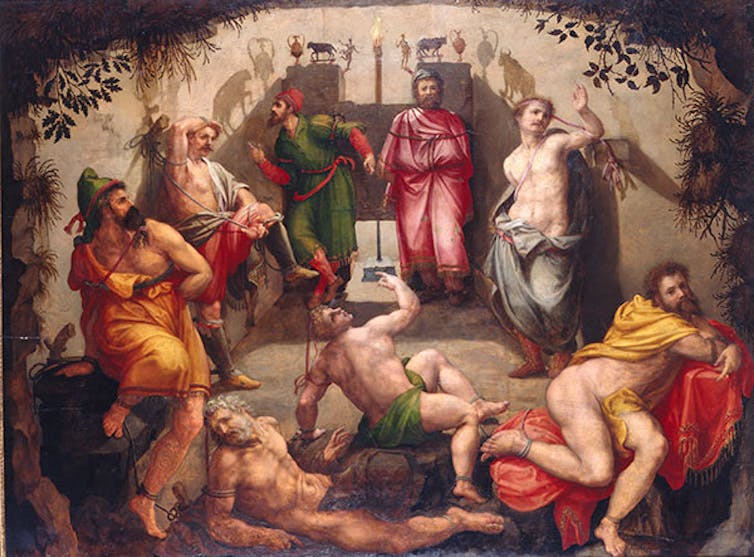 A 16th century painting depicting Plato’s cave, attributed to Michiel Coxie.
Wikimedia Commons
The philosopher is s/he who has turned around and climbed out of the cave to see reality for themselves.
Justice for such a person is voluntarily “going back down” into the cave to help others likewise turn their souls around. It is surely no mere chance that the first word of the Republic is Socrates telling us that “I went down yesterday to the Piraeus …”
The Socratic task is not easy. Socrates himself paid a heavy price for pursuing it. So the philosopher must be trained to “run the gauntlet of all tests”:
striving to examine everything by essential reality and not by opinion, holding on his way through all this without tripping in his reasoning …
The Republic itself can be read as as a masterclass in this kind of training. For this reason, it rightly remains a classic text, and a timeless challenge to readers of all persuasions.
A 16th century painting depicting Plato’s cave, attributed to Michiel Coxie.
Wikimedia Commons
The philosopher is s/he who has turned around and climbed out of the cave to see reality for themselves.
Justice for such a person is voluntarily “going back down” into the cave to help others likewise turn their souls around. It is surely no mere chance that the first word of the Republic is Socrates telling us that “I went down yesterday to the Piraeus …”
The Socratic task is not easy. Socrates himself paid a heavy price for pursuing it. So the philosopher must be trained to “run the gauntlet of all tests”:
striving to examine everything by essential reality and not by opinion, holding on his way through all this without tripping in his reasoning …
The Republic itself can be read as as a masterclass in this kind of training. For this reason, it rightly remains a classic text, and a timeless challenge to readers of all persuasions.
Authors: Matthew Sharpe, Associate Professor in Philosophy, Deakin University
Read more http://theconversation.com/guide-to-the-classics-platos-republic-127724




